Content warning: this essay contains strong references to sex, drugs, mental health, suicidal ideation, and religion
“Oh no”, I said to him, “I haven’t done the spiritual work.” My body was slumped in the bottom of a circular ravine, looking up towards a bruised and cloudy sky. Around the periphery of my vision, the steep cliffs rose up to meet the thunder. It had been 45 minutes since I’d swallowed the little capsule of MDMA. Ever since, I’d been lying on the therapist’s couch, my eyes blindfolded, a pair of noise cancelling headphones blocking out everything from his stirrings to the workmen downstairs. Above me, a bird circled overhead, something I’ve seen before during psychedelic experiences. I willed this bird to be the dove that I knew, drawing me up past the clouds. But it wasn’t a dove.
I knew I hadn’t done the spiritual work the moment I swallowed the first dose. This wasn’t my first rodeo; I’ve had a number of experiences like this before - the conscious, non-recreational use of psychedelics as an aid to something like therapy, although God knows such a clinical term doesn’t really encapsulate the depth of the experience. The good they’ve done me has been incalculable, explorations somewhere between therapeutic and spiritual moments where I have pushed past some of the conscious repressions built up as psychic defence mechanisms over a lifetime. This is because MDMA affects the amygdala, the part of the brain associated with fear responses. With its functioning suppressed, I could address the traumatic memories that my brain had used fear responses to avoid. Emotions and memories, senses of being that I had assumed lost under twenty years of accumulated depression, returned. Traumatic events themselves - events whose recollection, in the past, would have lead to months-long depressive episodes, anxiety attacks, and even suicidal ideation - could be approached, handled, discussed, and even put to bed. In my first session the realisations were intense. Yes, I endured terrible things. But looking at them head on, I realised that in that enduring, I had done the right things, I had loved and had been loved, and I had survived. Learning that one survived is perhaps the strongest, most consequential realisation: the threat is over. The next morning I woke early. My boyfriend was sleeping deeply, so I went into the living room and lay flat on the sofa. I played a song, Canteloube’s Baïlèro, and watched the first fingers of morning sun creeping over the rooftops. My eyes closed. I thanked my fears and depression and anxieties for all they have done over the past two decades to try to protect me, but really, they could leave, they are not needed now.
There is little use describing these visions themselves; hearing other people’s drug stories is worse than other people’s dreams. Anyway, mysticism is all about experience: you don’t see visions, you have them, inhabit them. Meaning is transferred by being felt, not being reasoned. But those experiences were joyful, that sudden sensation of not so much being subsumed into a divine presence, but at least having a heightened consciousness of it. As a therapeutic practice, their use has allowed me to deal with grief and trauma that I spent years talking around, to feel and understand again the love that remains from a relationship long after a parent’s death. During my last session, at the moment of the most light, the most understanding, I had said to him, dipped in euphoria, “this is a shortcut to the divine!”
This wasn’t to be one of those times. I’d picked up a horrible head cold in London a week or two earlier; to shake it, I’d not been working, staying in bed and allowing myself to slip into bad habits of compulsive doomscrolling and trash tv, filling myself with the frantic mess of immediate connection. Filling myself with unholy images. For a moment I began to spiral, disappointed that I wouldn’t again feel blissfully overpowered by the light. “I’m distressed”, I told my therapist (let’s call him Douglas). “Try leaning in to your distress,” Douglas said, “allow yourself to feel it”. Without the work, there was nothing to focus the overwhelming power on; Douglas changed the music from my choice, Hildegard, to something else, something that felt completely without content. That’s how I felt, too: empty, wordless, and with it, the blood seemed to drain from my body.
These sort of spiritual and psychological challenges are surely part of the path, of course. After two decades of depression, emptiness feels like my lot, almost my default mode. No wonder then that the heightened senses of emotion that come with, and after, any therapy can be bewilderingly exciting. Wow, you can feel pain, and cry, and live. But to dive into emptiness felt a thousand times worse than diving into pain. Douglas guided me into contact with something, and I came into contact with my body, and I clung on. My own relationship with bodies and desiring is one of those areas that throws up the biggest barriers for me. I knew when I started the session that it was something I wanted to focus on, although I guess I was foolish for thinking you could hack a path through the thickets of desire without the undergrowth scratching back.
“I can’t be desired”, I told him, or felt I told him. That’s what it comes down to. Some gay guys only ever want to see a gay therapist. There’s too much explaining to do, otherwise. Not me: the explaining is like describing your country to a foreigner. It clarifies. What’s more, sometimes you don’t want sympathy, you need someone to pin it on. A heterosexual can become a stand-in for heterosexuality, and an empathetic, curious heterosexual, a heterosexual who wants to help, can be even better. It heightens the sense that it’s the very assumption of heterosexuality, the default, blind ideology of it all, that helped construct this living nightmare of sex, possession, jealousy and silence in which we live. You claim to care, you think, yet you haven’t even searched out the very basics of the experience of others. It’s okay to rage like this. It’s unfair, but it’s okay. Lean into it.
“You can’t understand,” I told him. My first consciousness of sex was to become a vector for death. The world might have changed but I haven’t. “Imagine this”, I told him “you’re on the beach with friends. The cove curves around the Mediterranean. It’s a hot day, you can taste the sea water on your lips. You’ve had a beer. You excuse your friends and cross the railway lines behind the gay beach, climbing up into the groves of pines and olive trees. Underneath your feet the scent of pine needles rises and the sun prickles against the back of your neck. You see a man, a Greek man perhaps, the most beautiful man you’ve ever seen, and he follows you, and you start to kiss him and you fuck him there and then with the sun and olives and the cliffs falling down to the Mediterranean. This is perfect, you think, this is the most you’ve ever felt alive. Yet you’re thinking, as he cums or you cum, you’re thinking about death, about all those who died before you”.
I told him this because I wanted him to feel bad. I don’t know if this is something I’ve felt, or something I’ve read that gay men feel. I think I’ve felt it. I know I’ve felt it. But I don’t know if it’s mine to feel. I don’t know if it’s a real danger, or if I’m jumping on the grief and pain of others to feel myself. I don’t know if in feeling it, that dread with the flu that happens to follow the night in the sauna, I’m making it all worse, spreading the shame and stigmatising my fellow men. I don’t know. But it is there, isn’t it - when I came out, aged 14, it is the first thing that anyone said to me, whether they loved me or they hated me. “You must be careful,” my mother said. “I hope you die of AIDS,” my classmate said. It was the year 2000, and things were still different then, not different like the eighties, but different still. It was still the time of Section 28. We did cover homosexuality in sex education. The teacher wheeled in the TV trolley and slid a VHS into the player. I watched Tom Hanks die, I thought “am I going to die?”, and that was that. The lunch bell went and we left the classroom, the rest of the class having learnt little more than a new handful of jokes.
But this is a front-of-brain anger. I was looking for a fear that lingered somewhere deeper, something felt, not thought. “Lean in”, Douglas said through the dark. I’m writing this on my phone while walking across the mountains that rise behind Barcelona. I’m trying to walk off the comedown, a twenty kilometre loop on my own, letting my brain just run itself bare, letting the birdsong seep into the silences. As I come to a crossroad where my thin path crosses a track, I see a car abandoned by joyriders at the junction. It was here last time I took this route, two months ago. Since then its windows have been broken in. On the back, someone has carved into the blue paint the words “ride or die”. That’s how you access what is felt, the part thinking can’t reach. You must lean in to the feeling with your whole body. You must ride or die.
Riding, I was floating across a sea of naked bodies, half Gericault’s Raft of the Medusa, half Kylie’s Slow. I watched from above. The bodies shifted listlessly amongst themselves, not writhing in sexual ecstasy, and barely touching. Instead, simply being watched, their skin so vivid that my fingertips could almost sense their softness. Folded-over limbs revealed dark armpits. Fat gathered the imprint of the ceramic tiles. A stomach pulled tight between waistband and rib-cage. “Can you become one of the bodies?” Douglas asked. I laughed. It hadn’t occurred to me to become desired, hadn’t occurred to me at all that I could be, and not be observing. My eye was the centre of the scene. The raft of bodies existed because I perceived it, existed only from the angle from which my eye drew in the light. As the desirer, I brought them into being; I was the subject of desiring, and the bodies the objects of desire.
This was the pharmacological representation of my primary sexual neurosis. Not the front-of-brain anger, but the back-of-brain fear. I spend my life constructing sexual relationships in which I am the desirer, and in which others need or want to be the objects of that desire. I have little urge to be wanted; at best, I am wanted for my ability to want them sufficiently. Its a fucked up and fun drive that underpins kink for me; to purposefully construct a sexual encounter where I can be one thing entirely, to formalise away the risk of being desired, makes life easier. In return for control and care, my partners give me the gift of being the one who looks, and is not looked upon, who wants, and is not wanted. Locked in to that subject-object relation by my earliest sexual experiences, I lean into it.
I dare say it could have gone the other way; had I learned to recognise and be thrilled by the desirer’s attention, I could have been hooked. Douglas asked where this might have come from, and I could tell him, instantly. It started at the beginning. I had had sexual experiences before, but they were experiments. When I was about 13 or 14, however, I had a close friend, Josh. One night he initiated a brief sexual contact; I reciprocated. In retrospect, I was in love with him; this was the first sex for me based in desire and not circumstance. The next morning, he wouldn’t look at me. We have never spoken since. It wasn’t a moment I could afford to lose a friend. Everything fell apart; I had wanted, and wanted to be wanted, and I had got what I desired, and I was desired, and everything fell apart. I think from that moment on, to be desired was a prelude to being destroyed.
The world is a sad place but we can integrate ourselves into a practice of compassion. There was no model for what I felt then, and no model, really, for me. We were living through the tail end of a moral panic started some 15 years earlier, a fight between a gay movement and a homophobic state that had resulted in Section 28, a law which in theory prevented schools from promoting homosexuality as a “pretended family relationship”. In practice, it produced a huge wave of silence: silence not just in “promoting” homosexuality, but a silence that denied its existence, a silence in the face of bullying. There was humiliation everywhere, but nobody witnessed it. There was an emptiness at the heart of the project of education, a project to care for the growth and development of young people from children to adults. That abrogation of responsibility to help children, because in helping them you might have to encounter your own fears and ignorances, was an act of cowardice that we look doomed to keep repeating, now with trans kids in particular, and perhaps also with boys and young men.
I would have liked a role model, as a young man, someone brave enough to speak through that silence, but none were forthcoming. I think that loneliness is what a lot of gay men of my generation are talking about when we say “we felt different”. There’s a danger, though, when looking back, that we cast all those heterosexual boys as an indistinguishable, malignant whole. It’s the sort of thing that we do when we say “we gay people missed out on our adolescence because we couldn’t be ourselves,” as if for the straights, adolescence was the thing of teen movies, all cheerleader squads and sneaking through bedroom windows and driving down to Make Out Point. The truth is, the model of masculinity we all experienced and the model of sex and gender that dominates fucking sucks for almost everyone. Most boys felt different, straight, gay, bi or otherwise. This system works for no-one. The appeal of someone like Andrew Tate for young and scared straight men is that he tells you it’s going to work for you; you won’t be losing this game forever.
Back on the couch, I couldn’t help but feel a deep resentment for Douglas. I approached him about this session. He warned me that it might not be so full of joy as the last, but I went in anyway. I resent him for letting me choose. I resent him for telling me to lean in to the anger I’m projecting onto him, because I don’t want him to be the kind man he is at that moment, I want him to resist. I resent him especially for how the psychedelics affect our relationship. I’m aware of the risks of transference in regular talking therapy - of confusing the clinical relationship between client and therapist for a different type of relationship, whether a friendship, a romance or a parental bond. Normally, when I feel that attachment, I save face by keeping it to myself. Under-encumbered by inhibitions, however, I drop my defences. We could be friends, I tell him, not once or twice, but again and again, across the sessions. He kindly but decisively closes that line down each time, with a compliment, but still I’m left feeling foolish. We have spent 20 hours like this, him trapped in an eternal smoking area with a gurning prick insistent that his own feelings must be universal, that he has transcended transference. What a fool.
Foolishness is one thing we cannot make our enemy, though. The foolishness of telling him I care, of taking another dose, of laying it all bare; these are risks with great rewards, to my mind. Even writing this, to you, is a foolish risk: to care and to believe, and to do so on screen, where anyone can read it and share forever, are openings into which bad faith and humiliation can intrude. To talk of these things like therapy and psychedelics, or worse, to talk of belief, of the divine, is to make yourself a target. But if you don’t post horny on main, you miss those connections. Let me risk it again.
This is a foolishness that I think young men cannot risk. I certainly couldn’t. As a young man I was taken with New Atheism, for example. I guess I felt it was more important to be right than to be kind or happy; in reality, I think I was looking for a way that I could be cruel and unhappy with all my heart. One phrase from that movement really captured me at the time: “By all means let’s be open-minded, but not so open-minded that our brains fall out.” Now I disagree. Let your brain fall out every now and then. Let yourself be fooled and then humbled. Better to be the dancer lost in the music than the guy with the camera phone uploading your dance for a public shaming, to my mind. The terror of foolishness is a curse of modern young masculinity. That’s another appeal of Andrew Tate for the sort of man that I could have been; if you approach everything as an attempt to fool and hoodwink you, you will never be taken for a fool. Andrew Tate is a man living in abject terror of being seen as a fool, and hence sees everything as a world of people - women - trying to fool him. Like all anxieties, his is a self-fulfilling prophecy - his abject fear of being perceived foolish, and hence unmasculine, unworldly, has turned him into the biggest fool in the world, a cringeworthy cardboard cutout of a man who would be pitiful were he not so clearly abusive. I see this fear everywhere, the fear of caring too much.
I think sometimes my fear of having this conversation about men and masculinity is part of that same fear of caring too much. It’s easier to say that yet another conversation about men centres them. It’s easy to pretend homosexuality means one isn’t culpable, that this is a straight man’s problem. Not true, patently not true, but writing and talking candidly, with the risk of getting it wrong or upsetting someone, is scary. But in the absence of frankness from all us, it is the Andrew Tates of the world who fill the gap. He’s a man whose obsession with being the subject and never the object is raised to an obscene and unthinking fetish. To see is to own, to use and never risk being used.
I read a tweet. It asked “so who are some alternatives to andrew tate-- like men with compelling levels of confidence and ambition but where you'd be totally happy to find that your son looked up to them”. John Berger is that man for me, a model of masculinity from my early twenties that I continue to be inspired by, someone who could hold compassion and anger in balance. A man whose understanding of the world was marked by an attentiveness to others. It’s no surprise that he was a man who drew: drawing is a contemplative practice, after all, a practice where one must take time to look at things in order to describe them as they really are, a practice which recognises you as the perceiver will always have a role that shapes you as a describer. He was a man who drew, but who thought critically about drawing, about his own eye as the perceiver and the power that perception and description hold. Are these uniquely masculine virtues? Of course not. But if we are in the business of ascribing virtues as models for young men, are they not superior to the virtues of possession and control that men like Tate espouse?
I feel insane; unable to concentrate, my eye flickers from mirror to window, tile to sunray, never fixing, never contemplating. My brain follows suit, flickering between thoughts, never resting on them, each one unrelated to the thing I am perceiving.
There is a difference between seeing, perceiving and witnessing, just as there is a difference between listening and hearing. To witness is a moral act; it is to see and to acknowledge the thing you have seen. It happened. I was there. In that way, witnessing is an act of care, and in some ways I think this was a quality of Berger’s that I admired. By care, I mean the practice of paying attention to the suffering of others. Of observing, of looking, but of witnessing it too. Yes, this happened to you - a quality that men like Douglas also have. To have one's suffering noticed, to refuse to look away from it, to risk to care - this seems to me the opposite of cynicism, and perhaps the start of healing. One must notice, and lean in to, the pain of seeing and suffering.
Having spent a week online, I was underprepared to do the work of witnessing. I think this is what I meant when I said I had failed to do the spiritual work. The internet, and especially social media, is a territory where your attention is constantly claimed. There is no contemplative space there, no ability to stop and witness. One’s response to suffering might be to get angry, to laugh, to scroll on by, but it is rarely to witness, to sit with the suffering in your mind, to allow yourself to feel it, uncomfortable as it may be. As I lay there beneath the dark clouds, I struggled to lean in to that darkness. I resented the man who brought me there, Douglas, not despite his kindness in witnessing my suffering, but because of it. Yammering away like the gurner in the smoking area, I felt like the fool. Exposing my suffering, I felt like the fool. Perhaps there is something emasculating in being witnessed. For once, I was not the one looking, not the one controlling. I was not dominant, not perceiving. I was seen, feeling, unknowing.
In his epistle to the Corinthians, Paul described the importance, indeed the dominance, of charity. Christian charity is not giving to the poor. Nor is it “love”, as chapter 13 of 1 Corinthians is often interpreted as, when read at weddings, when it is rendered like this: “Love is patient, love is kind. It does not envy, it does not boast, it is not proud.” No, it is Christian charity, the love of the divine for the human, which the human then displays towards others, recognising, in the Quaker tradition, that of God in everyone. It is this that is our only connection with the divine - that way in which we interact with the world. In chapter 13 he notes how everything else - prophecies, tongues, knowledge - all this will vanish away, because these are parts in which we come to know charity. He then says something that I think will resonate with anyone who has experienced a part of this divinity through a mystical experience:
But when that which is perfect is come, then that which is in part shall be done away. When I was a child, I spake as a child, I understood as a child, I thought as a child: but when I became a man, I put away childish things. For now we see through a glass, darkly; but then face to face: now I know in part; but then shall I know even as also I am known.
To be seen and known, to be witnessed, is an act of charity. In reality, there is no shortcut to the divine. We see through a glass, darkly: a glass, in the sense it is meant here, is a mirror. That is, we see that love working within ourselves. Psychedelics might break down some of the conscious barriers to addressing the pains and traumas, or even the joys and vitality of your life. But to make that connection with love, and with care, whether for those in our lives or for ourselves as hurt creatures: that slow work of witnessing is the spiritual work of a lifetime, and it must come from you leaning in to love. Ride or die.
‘utopian drivel’ is written by me, Huw Lemmey. If you’re a paid subscriber, thank you so much for your support. Please do forward this to anyone who might enjoy it.
If you aren’t a paid subscriber, please consider subscribing; paid subscribers also help support free subscribers. Paid subscribers get access to the entire archive of 100+ essays, including posts such as this essay on mysticism and the “blabryng fleschely tongue”, this essay on watching the Queen’s funeral at a gay sauna, and this piece on Gore Vidal and “fag affect”. Free subscribers get occasional posts, like this guided walking tour around London’s world of queer espionage or this essay on the limits of gestures of allyship.



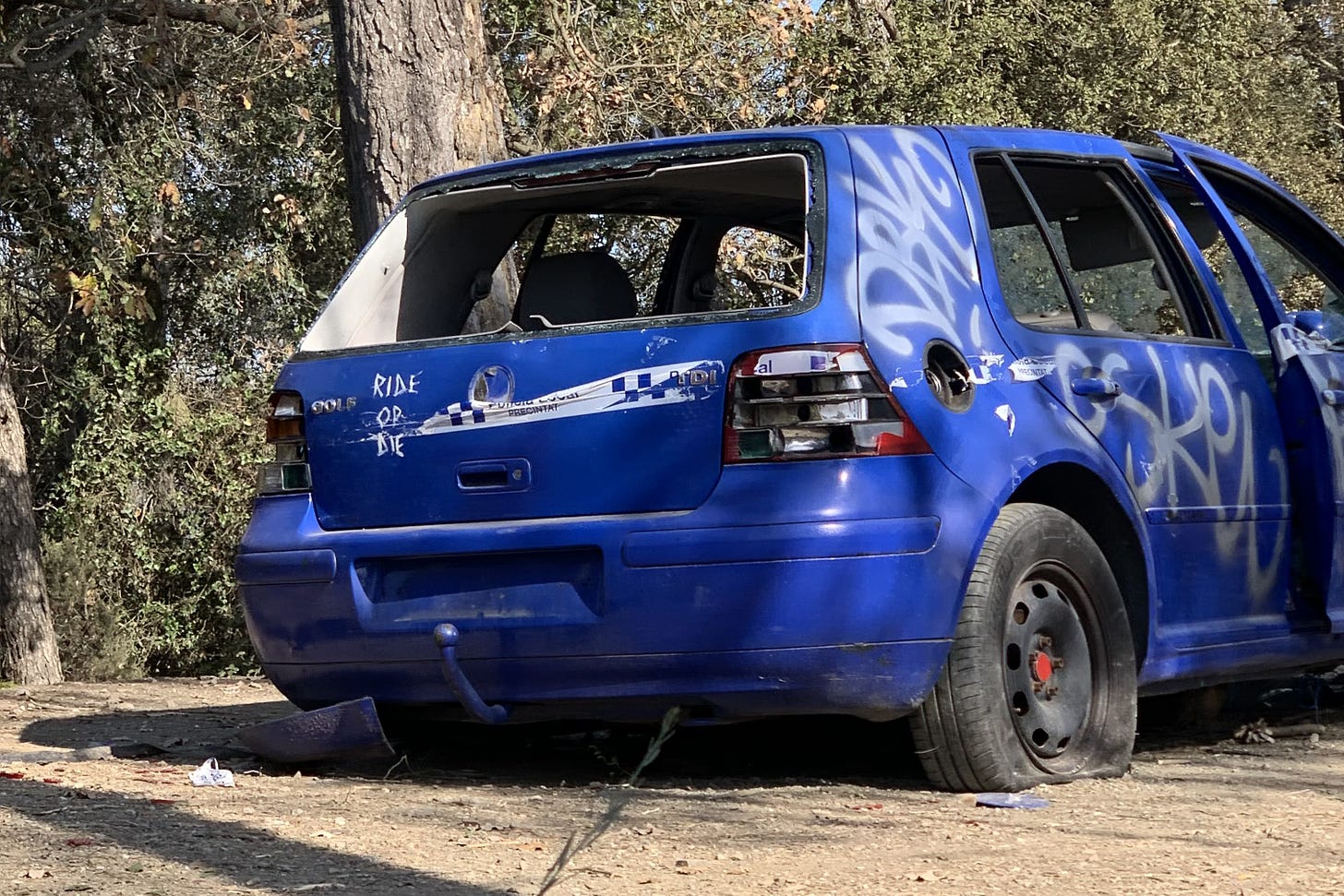

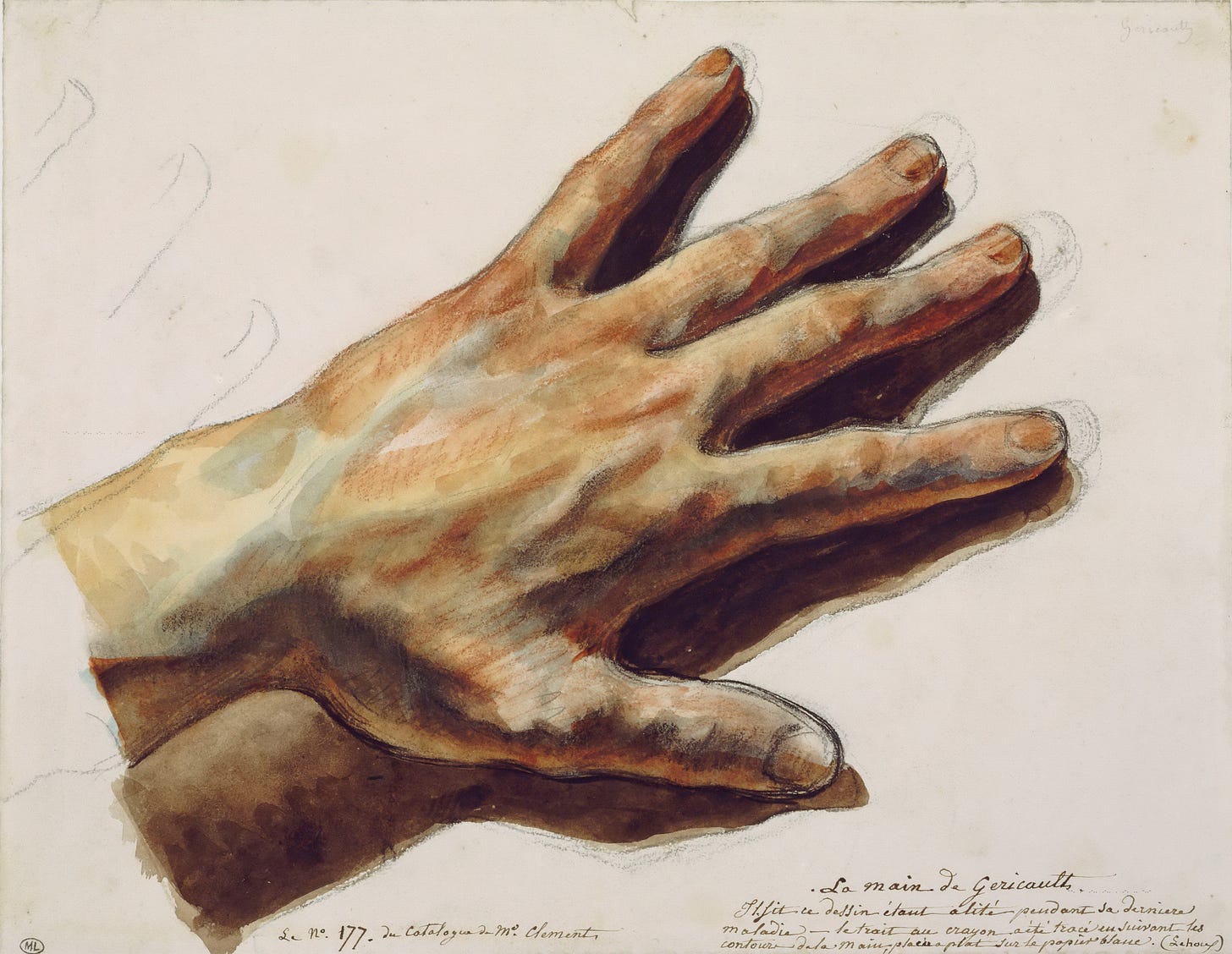


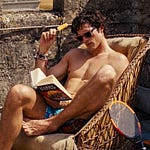
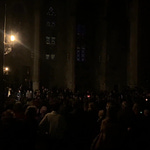
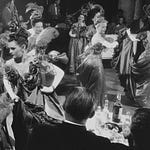
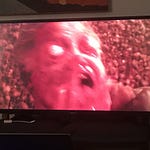

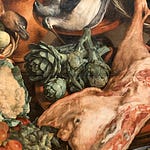
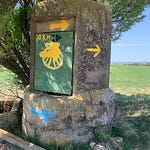
Share this post